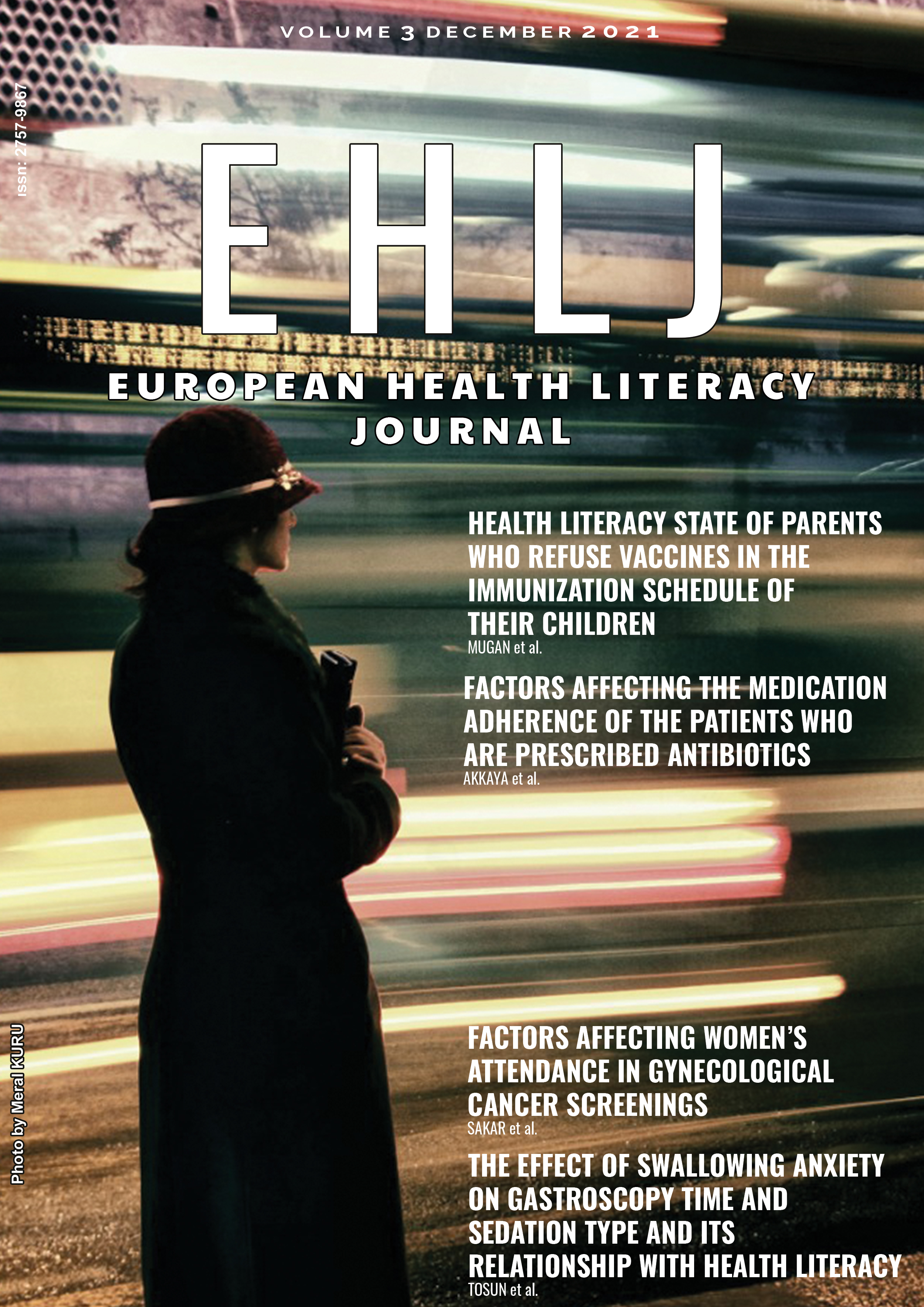Author :
Abstract
Keywords
Abstract
Aim: In this study we aimed to investigate the health literacy state of parents who refused one or more vaccines in the immunization schedule of their children for the first 24 months, and other situations that could be associated with vaccine rejection.
Methods: All of the families who were registered to the Bağlaraltı Family Health center between January 2020 – April 2020 and who refused one or more vaccines in the immunization schedule of their children for the first 24 months were included in this study. The participants were divided into two groups as those with vaccine rejection and those without vaccine rejection. A sociodemographic data form and the European Health Literacy Survey short version were applied using a face-to-face technique.
Results: In the study that we performed with 44 families with vaccine rejection and 44 families without vaccine rejection, statistically no difference was observed between the two groups in terms of educational status, income level, smoking and alcohol usage. Limited-inadequate health literacy was associated with vaccine rejection (p=0.16). In the group with vaccine rejection, the rate of mothers who refused the tetanus vaccine during their pregnancy and the OGTT test was higher than in the control group (p<0.001). The number of primary care applications was lower in the group with vaccine rejection (p<0.001) and it was detected that these families applied less to health care institutions (p=0.022). 59.09% of the parents indicated that they refused to get their children vaccinated because they found it harmful and 56.82% of them were influenced by others who refused vaccination.
Conclusions: Low health literacy had a negative effect on decisions of families for vaccination of their children. Vaccine rejection is at the same time associated with less usage of the health care system. Family physicians must reach out to these families and give them the necessary training.
Keywords
- 1. Bozkurt HB. Aşı Reddine Genel Bir Bakış ve Literatürün Gözden Geçirilmesi. Kafkas Tıp Bilimleri Dergisi. 2018; 8(1): 71-76.
- 2. Wolfe RM, Sharp LK. Anti-vaccinationists past and present. BMJ. 2012; 325(7361): 430-432.
- 3. Swales JD. The Leicester anti-vaccination movement. The Lancet. 1992; 340(8826): 1019-1021.
- 4. Report of The Sage Working Group On Vaccıne Hesitancy. Avaliable at: https://www.who.int/immunization/sage/meeti ngs/2014/october/1_Report_WORKING_GROU P_vaccine_hesitancy_final.pdf. Access Date: 26 04 2020.
- 5. Gur E. Aşı kararsızlığı-aşı reddi. Türk Pediatri Arşivi. 2019; 54(1): 1-2.
- 6. Emiral GO, Aygar H, Isiktekin B, et al. Health literacy scale-European Union-Q16: a validity and reliability study in Turkey. Int. Res. J. Medical Sci. 2018; 6(1): 1-7.
- 7. HLS-EU Consortium. Comparative report of health literacy in eight EU member states. The European Health Literacy Survey HLS-EU. 2012.
- 8. Ilter H. Doktora tezi, Konya ilinde çocukluk çağı aşı reddi konusunda anne-baba görüşleri ve aşılamayı etkileyen faktörler. Necmettin Erbakan Sağlık Bilimleri Enstitüsü Halk Sağlığı Anabilim Dalı. 2020.
- 9. Gulcu S, Arslan S. Çocuklarda Aşı Uygulamaları: Güncel Bir Gözden Geçirme. Düzce Üniversitesi Sağlık Bilimleri Enstitüsü Dergisi. 2018; 8(1): 34-43.
- 10. Gust DA, Strine TW, Maurice E, et al. Underimmunization among children: effects of vaccine safety concerns on immunization status. Pediatrics. 2004; 114(1): e16-e22.
- etkileyen faktörler. Perinatoloji Dergisi, 2019;
- 12. Maral I, Baykan Z, Aksakal FN, Kayikcioglu F, Bumin MA. Tetanus immunization in pregnant women: evaluation of maternal tetanus vaccination status and factors affecting rate of vaccination coverage. Public Health. 2001; 115(5): 359-364.
- 13. Sagsoz N, Apan T. Gebelerde tetanoz, hepatit B ve rubella seropozitiflik oranları. Journal of Clinical Obstetrics & Gynecology. 2002; 12(1): 52-55.
- 14. Yaprak M, Gümüştakım RS, Tok A, Doganer A. Gebelerde Oral Glukoz Tolerans Testi Farkındalığının Tespiti. Ankara Medical Journal. 2019; 19(3): 635-647.
- 15. Desdicioglu R, Yildirim M, Suleymanova I, Atalay I, Ozcan M, Yavuz AF. Gebe Kadınların Antenatal Testlere Yaklaşımını Etkileyen Faktörler. Ankara Med J 2017; 17(1): 57‐64.
- 17. Luthy KE, Beckstrand RL, Callister LC, Cahoon S. Reasons parents exempt children from receiving immunizations. The Journal of School Nursing. 2012; 28(2): 153-160.
- 18. Ciftci F, Demirci H, Ciftci HN, Ocakoglu G. Validation of Turkish Version of Newest Vital Sign Scale to Assess Health Literacy. Bezmialem Science, 2021; 9(2): 219.
- 19. Turkoglu AR, Demirci H, Coban S, et al. Evaluation of the relationship between compliance with the follow-up and treatment protocol and health literacy in bladder tumor patients. The Aging Male. 2018.





